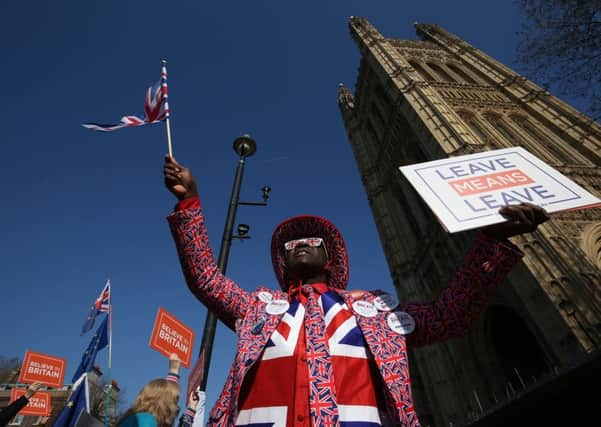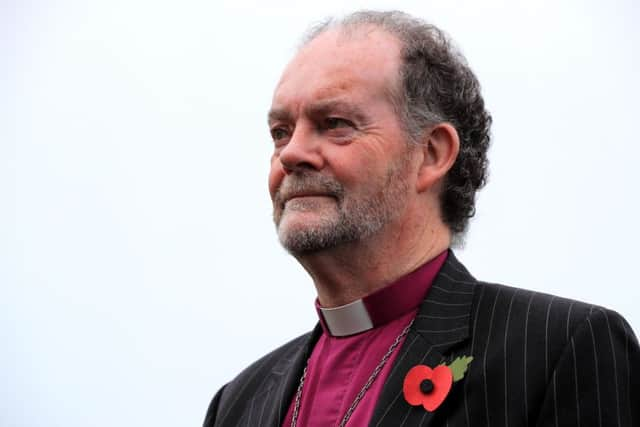Bishop James Jones: Brexit – the looking back needs to give way to the looking forward


Not so much between Remainers and Leavers but between simplicity and complexity.
Between the simple vote to leave or remain, and the complexity of disentangling a 40-year relationship.
It’s also been a struggle between the heart and the mind.


Advertisement
Hide AdAdvertisement
Hide AdMany of us voted with our emotions and have had to watch others negotiate with their heads.
And if that’s not been enough, the struggles have been intensified by the debate about democracy itself and who should have the last word – a once-and-for-all referendum of the people or a Parliament elected by the people.
Seldom have the two little prepositions ‘of’ and ‘by’ had such force in our history.
As we survey the Channel between us and the rest of Europe, there are many hidden currents.
Advertisement
Hide AdAdvertisement
Hide AdThe nation is divided, the two main parties are divided and many individuals are divided within themselves.
So let me take you to a corner of the United Kingdom, to the heart of England and to a village near Bury St Edmunds and to a monk and poet of the 15th century called John Lydgate.
He wrote words that allegedly inspired a politician who presided over a bitterly divided nation.
The country was America, the politician was Abraham Lincoln and the words of the Reverend Brother John Lydgate were these:
“You can please some of the people all of the time,
You can please all of the people some of the time
But you can’t please all of the people all of the time.”
Advertisement
Hide AdAdvertisement
Hide AdIn a pub quiz most would attribute the saying to a politician.
But it was a priest and a pastor who coined them.
For pastors as well as politicians know the fickleness of human nature.
But how are we the led to evaluate the competing leaderships at a time when it’s impossible to please everybody?
Over the last couple of decades, there’s emerged a consensus about the principles of public service.
Advertisement
Hide AdAdvertisement
Hide AdThey’re the Nolan Principles. I doubt many know them off by heart. But they’re worth pondering and applying to all those who seek to lead us at this time of uncertainty.
They’re a sort of Seven Secular Commandments. Seven hallmarks with which to test and measure the stature of leaderships on offer.
They are selflessness, integrity, objectivity, accountability, openness, honesty and leadership.
And now ‘the clock is ticking’ and ‘the countdown has begun’.
Advertisement
Hide AdAdvertisement
Hide AdPhrases like that take me back to the moment in 2011 when I was told I had to have a triple heart bypass.
After an angiogram on a Friday, I was kept in over the weekend to be first up on Monday.
I’ll not forget the conversation with the surgeon who explained all the risks, and then asked me to sign the consent form.
There was a momentary storm in my brain thinking I could refuse.
Advertisement
Hide AdAdvertisement
Hide AdI signed – but throughout the weekend, as the clock was ticking, I kept wondering if there was any other way.
This scenario comes to mind because, whenever I try to make sense of how a group behaves, I often reduce it to how a single person might react in similar circumstances.
As a country, we made a decision in 2016.
Right or wrong, for better or for worse, that vote told us as a people something about our conflicts and our commonalities.
At the end of this first week of the last month the countdown has certainly begun.
Advertisement
Hide AdAdvertisement
Hide AdAnd just as a patient who’s signed the consent form, yet continues to wonder about other possible options, so we, as a nation, stare into the future wondering if there’s any other way.
Without belittling the genuine actions of Members of Parliament, it feels to me like ever since the vote there’s been a lot of displacement activity, as if collectively we’re trying to obviate the consequences of both the past and the future.
It’s not so much about facing up to what we voted for, but to what that vote showed us about the nation’s soul.
In his life Jesus encountered a lot of displacement activity.
Advertisement
Hide AdAdvertisement
Hide AdPeople who were on the verge of following him suddenly found other preoccupations.
Reaching for an agricultural metaphor that resonates with Yorkshire farmers he replied: “No one who puts their hand to the plough and looks back is fit for the Kingdom of God.”
This was not as glib as it may seem.
He could have been speaking of and to himself.
He later confessed that his own soul was like a shipwreck as he contemplated the crucifying prospect that lay ahead of him. Even so, he knew his future held many twists and turns.
Whatever happens to us this month and whichever way we voted, I imagine that in all the compromises there’ll be a little bit of dying in each one of us.
Advertisement
Hide AdAdvertisement
Hide AdBut the truth is, as in the case of the aforementioned patient, the looking back will eventually give way to looking forward.
The Right Reverend James Jones KBE was Bishop of Hull from 1994-98 and the Bishop of Liverpool between 1998-2013. He lives in Ryedale.